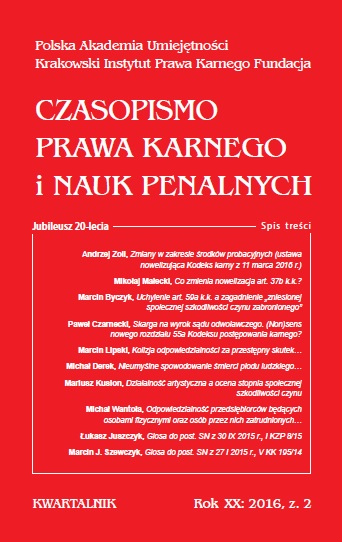Nieumyślne spowodowanie śmierci płodu ludzkiego w świetle etyki i polskiego prawa karnego
Unintentional causing of death of a human fetus in ethics and Polish Criminal Law
Author(s): Michał DerekSubject(s): Criminal Law
Published by: Polska Akademia Umiejętności / Krakowski Instytut Prawa Karnego Fundacja
Keywords: unintentional causing of death; protection of life in prenatal phase; bioethics; sources of criminal law; functions of criminal law
Summary/Abstract: Tekst porusza kwestię kryminalizacji czynów skutkujących śmiercią płodu ludzkiego. Autor wskazuje na filozofię oraz etykę jako podstawy dla określenia pozycji prawnej istoty ludzkiej w fazie prenatalnej. W tym celu zostają przedstawione poglądy etyczne reprezentujące znaczące stanowiska w sporze o status moralny płodu. Następnie przywołany zostaje standard ochrony płodu ludzkiego wynikający z Konstytucji RP i prawa międzynarodowego oraz obowiązujące przepisy polskiego prawa karnego. Autor komentuje stanowiska uznające konieczność rozszerzenia ochrony istoty ludzkiej w fazie prenatalnej i wykazuje, że narzędziem służącym temu celowi powinno być prawo karne. Argumentów dostarczają etycy i filozofowie wskazujący na zależność między statusem płodu a zakresem karalności pozbawienia jego życia. De lege ferenda postuluje się kryminalizację każdego czynu nieumyślnego, który powoduje śmierć płodu ludzkiego, z wyjątkiem popełnienia takiego czynu przez matkę dziecka. The article is concerned on the problem of criminalization of the acts resulting in death of a human fetus. Author points out philosophy and ethics as basis for defining the legal position of the human being in a prenatal phase of life. For this purpose, ethical views representing a major positions in the dispute about the moral status of the human fetus are presented. Furthermore the legal standards of protection of the human fetus imposed by the Polish Constitution, international law and the applicable provisions of Polish criminal law are shown. The author comments on the opinions which recognizes the need to extend the protection of the human being in a prenatal phase of life, and indicates that the instrument for this purpose should be criminal law. Arguments for this solution are provided by ethicist and philosophers who indicate the relationship between the status of the fetus and the scope of the criminalization of the acts resulting in death of fetus. Therefore it is stated de lege ferenda that every unintentional act resulting in death of a fetus should be criminalized, with exception for the acts committed by the mother of a child.
Journal: Czasopismo Prawa Karnego i Nauk Penalnych
- Issue Year: 20/2016
- Issue No: 2
- Page Range: 129-154
- Page Count: 26
- Language: Polish

